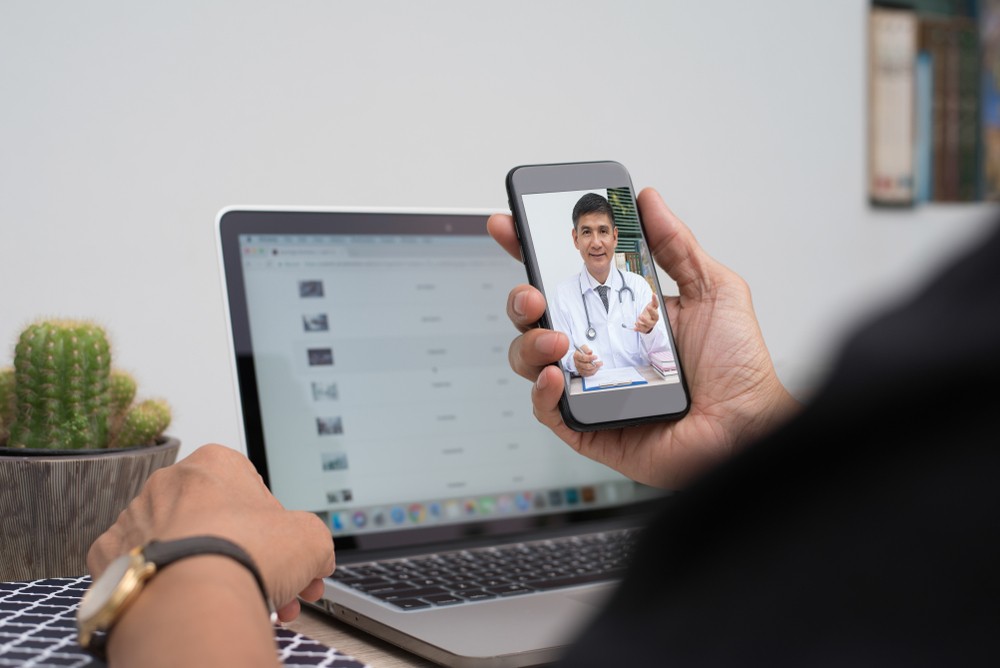Popular Reads
Top Results
Can't find what you're looking for?
View all search resultsPopular Reads
Top Results
Can't find what you're looking for?
View all search resultsMajor Indonesian hospitals go digital to tap into growing telemedicine market
According to Market Data Forecast, the telemedicine market in the Asia Pacific is projected to grow from US$8.51 billion in 2019 to $22.45 billion by 2024.
Change text size
Gift Premium Articles
to Anyone
M
any major hospital operators in Indonesian have launched their own teleconsultation services to tap into the growing telemedicine market in the country, which has been further accelerated by the COVID-19 outbreak.
Siloam Hospital chief information officer Ryanto Marino Tedjomulja said the hospital chain had launched its online outpatient services or teleconsultation on April 13 in partnership with Aido Health, an online healthcare provider.
“This service is meant to support the social distancing program,” he said in an email correspondence on Friday, adding that patients who were unable to go to a hospital could also use the service to consult with a doctor.
As of now, the program has more than 300 medical specialists, Ryanto noted.
The hospital operator, which currently runs 36 hospitals across Indonesia, started its digital program about two years ago and launched its own application called MySiloam in August last year.
“In the two months before the COVID-19 pandemic, that is from December 2019 to February, the number of MySiloam downloads had increased threefold,” Ryanto said, explaining that users sought information about COVID-19 and doctors’ schedules on the hospital’s digital platforms.
Aside from teleconsultations, Siloam has also adopted teleradiology, in which radiological images such as X-rays, CTs and MRIs can be distributed across its hospital networks. The hospital is now working on a plan to use telemedicine to help monitor patients’ conditions remotely, Ryanto said.
“Telemedicine will become part of the new normal. It is here to stay.”
According to Market Data Forecast, the telemedicine market in the Asia Pacific is projected to grow from US$8.51 billion in 2019 to $22.45 billion by 2024.
A report by Bain & Company, titled "Asia-Pacific Front Line of Healthcare Report 2020", says that the healthcare landscape in the Asia Pacific will expand at a rate almost double than that of the rest of the world by representing a more than 40 percent of the growth in global healthcare spending over the next decade.
The report, which surveyed more than 1,800 consumers and over 250 physicians across the Asia Pacific region, finds that there is a growing interest in preventative health, convenience and ownership over health care, indicating a prospective market in the long-term adoption of telemedicine.
In comparison to practices in three to five years ago, 59 percent of consumers expect their doctors to answer questions through phone and messaging services rather than waiting for the next appointment, 59 percent say they monitor their health using technology and 54 percent schedule appointments through mobile apps, the report shows.
It is no surprise that industry players who focus on developing and offering telemedicine services are growing their user base fast, especially during the outbreak.
Telemedicine platform Alodokter has been downloaded by more than 5 million users on Google’s Play Store and has more than 33 million active users as of March. Meanwhile, Halodoc has been downloaded more than 1 million times and has more than 9 million monthly active users.
Hospital operators are attempting to get a portion of the growing number of digital consumers, especially as patient visits to hospitals decrease amid the pandemic.
Pondok Indah Hospital Group chief executive officer Yanwar Hadiyanto told The Jakarta Post in a statement on Friday that the teleconsultation service the hospital launched in May had been met with enthusiasm from its patients.
The group, which runs three hospitals in Greater Jakarta, also has an app called RSPI Mobile to help patients schedule their doctor appointments.
He explained that the use of telemedicine would grow, in part due to uncertainties over the conclusion of the outbreak, but that its growth would be dependent on regulations imposed by the government.
“However, it is hard to fully replace face-to-face on-site consultations with doctors, understanding that there is a limitation in physical examinations that can be done [by using the app],” he said.
Mitra Keluarga investor relations Aditya Widjaja also noted a similar challenge.
Mitra Keluarga Group, which has 24 hospitals under its wing, has also branched out to include teleconsultations because of the outbreak. But the additional service was also offered to counteract a decline in outpatient visitors to their hospitals, Aditya said in a statement on Tuesday.
When asked by the Post about the future integration of other telemedicine services in its group, Aditya answered “it may still be far” into the future as at the moment, Mitra Keluarga Hospital's teleconsultation services were largely focused on accommodating recurrent patients.
Your Opinion Matters
Share your experiences, suggestions, and any issues you've encountered on The Jakarta Post. We're here to listen.
Thank You
Thank you for sharing your thoughts. We appreciate your feedback.
Share options
Quickly share this news with your network—keep everyone informed with just a single click!
Gift Premium Articles
to Anyone
Share the best of The Jakarta Post with friends, family, or colleagues. As a subscriber, you can gift 3 to 5 articles each month that anyone can read—no subscription needed!
Continue in the app
Get the best experience—faster access, exclusive features, and a seamless way to stay updated.










